|
|
|
Sort Order |
|
|
|
Items / Page
|
|
|
|
|
|
|
| Srl | Item |
| 1 |
ID:
099686
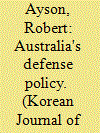

|
|
|
|
|
| Publication |
2010.
|
| Summary/Abstract |
Australian defense policy suggests a case where strategic ambitions exceed the country's direct security needs. But there are some peculiar reasons for this state of affairs. These include the relationship between the size of the Australian continent and its proximity to maritime Asia; Australia's sense of itself as a medium power with a strong interest in the future of the wider regional strategic balance; and the long-standing judgment that Australia needs a capacity for independent military action in its own area because even its closest allies cannot always be expected to help out. The Rudd government's 2009 Defence White Paper, the first such document in nearly a decade, confirms this pattern of thinking. In particular it reflects Australia's interest in not falling behind the defense modernization in the wider region of strong and rising powers (including, but by no means limited to, China). It helps return a sense of coherence to Australian policy which went missing in the post-9/11 era. But the new White Paper risks pushing that familiar logic too far. The Australian Defence Force envisaged for 2030 includes a larger flotilla of new-generation submarines, 100 Joint Strike Fighters alongside other capable combat aircraft, air warfare destroyers and new frigates. Many of these platforms, the White Paper suggests, could be armed with cruise missiles. This leaves no doubt that the writers of this review are serious about maritime operations in the Asian century. But one is left wondering whether the Rudd government and its successors can and will deliver on the whole package, and whether a more optimistic assessment of the region's strategic future could allow for a defense force which is closer to what has gone before.
|
|
|
|
|
|
|
|
|
|
|
|
|
|
|
|
| 2 |
ID:
099689
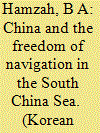

|
|
|
|
|
| Publication |
2010.
|
| Summary/Abstract |
The parties vying for territories in the South China Sea need not fear China. Despite expanding its military presence in the South China Sea, China does not pose any palpable military threat to the region. On the contrary, a rich and strong China could be a stabilizing factor. Likewise, while there is no evidence to suggest that China, a country that depends on international trade to sustain its strategic interests globally, will interfere with the freedom of navigation as defined under customary international law in the South China Sea. However, as a proud nation with a long-established civilization it will not shy away from challenging what it considers to be unauthorized military activities in its maritime space that is within its national jurisdiction, the South China Sea included.
|
|
|
|
|
|
|
|
|
|
|
|
|
|
|
|
| 3 |
ID:
099685
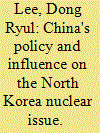

|
|
|
|
|
| Publication |
2010.
|
| Summary/Abstract |
China is the largest trading partner of the Democratic People's Republic of Korea (DPRK) and also provides considerable economic aid. Thus, China is said to have very strong economic leverage over North Korea. China's goal in its North Korea policy is to secure political and economic stability in the region peripheral to China by using such economic leverage. To achieve this goal, China is expected to approach the North Korea nuclear issue with a more comprehensive and longer-term viewpoint. China seeks to stably manage the North Korea nuclear issue by utilizing its economic leverage over North Korea in the short- to medium-term. China thinks that such management, through the Six-Party Talks, is the most appropriate solution to the North Korea nuclear issue as far as China is concerned. In the long term, China seeks to transplant its reform and open-door model into North Korea and to structurally soft-land North Korea as a China-friendly regime in the region that adjoins the northeastern border of China. If China determines that the North Korea nuclear issue will not lead to any serious insecurity directly affecting China, it is very likely that China will choose the method of managing the North Korea nuclear issue from a long-term perspective. To achieve such a long-term strategy, China must maintain its economic exchange and cooperation with North Korea, and not use it as a means to sanction North Korea.
|
|
|
|
|
|
|
|
|
|
|
|
|
|
|
|
| 4 |
ID:
099687
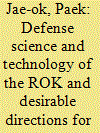

|
|
|
|
|
| Publication |
2010.
|
| Summary/Abstract |
The capacity of defense science and technology (S&T) at the level of an advanced nation is becoming an ever-more critical factor in the survival of the defense industry along with accumulation of military power. Until now, the development of advanced weapons systems and capabilities for essential technologies by the Republic of Korea (ROK) have remained at a relatively low level, due to the following factors: reliance on foreign nations for advanced weapon systems, research heavily focused on systems development as opposed to producing technologies, and a bifurcated structure of the Agency for Defense Development (ADD) managing research and development (R&D) on the one hand, and the defense industry taking on assembly and production on the other. In order to resolve this lagging in defense S&T standards, national S&T should be tied to and united with research in the defense sector; civilian resources should be astutely employed in a strategic manner; and cross-sector cooperation between the civilian and military sectors should be strengthened. Moreover, roles should be delegated accordingly between the state research facilities and the defense industries, while an R&D infrastructure based on development and accumulation of technologies should be established. The Ministry of National Defense (MND) has proposed a vision of securing "world-class defense science and technology capabilities," and this can no doubt become a most formidable and valuable security asset for the ROK.
|
|
|
|
|
|
|
|
|
|
|
|
|
|
|
|
| 5 |
ID:
099688
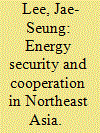

|
|
|
|
|
| Publication |
2010.
|
| Summary/Abstract |
The importance of Northeast Asian energy cooperation has been consistently emphasized in recent years to cope with uncertainties in the global energy market and to avert potential conflicts regarding energy supply among consumer countries. Energy supply, climate change, and the North Korean energy crisis have posed major concerns with respect to the energy security of Northeast Asian countries. However, the actual implementation of energy cooperation has reflected strong competition among major energy consuming countries, despite the perceived necessity of energy cooperation. Energy cooperation in Northeast Asia has become essential-not only for the facilitation of energy supply but also for the prevention of potential conflicts stemming from competitive energy procurement. This paper proposes that intergovernmental energy cooperation in Northeast Asia should focus more on the aspect of public goods. Intergovernmental energy cooperation should be based on a practical and achievable "soft agenda" rather than a "hard agenda" of large-scale supply projects. Successful energy cooperation in Northeast Asia needs a careful reconsideration of the agenda-setting and the modality of cooperation in terms of scope, membership, and issue linkage. The case for regional energy cooperation could be guaranteed if participating countries were to move together toward a virtuous circle of energy cooperation out of neo-mercantilist competition. Confidence-building measures to ease the escalation of conflicts regarding energy supply may also be an important basis for further energy cooperation.
|
|
|
|
|
|
|
|
|
|
|
|
|
|
|
|
| 6 |
ID:
099690
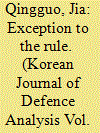

|
|
|
|
|
| Publication |
2010.
|
| Summary/Abstract |
The election of an opposition party candidate into the White House usually leads to friction between China and the United States. This paper argues that Barack Obama's election will serve as an exception. Instead of taking a harsher line on China, President Obama would inherit many of Bush's pragmatic policies on China. This has already been proven by the stable development of relations between the two countries during the better part of Obama's first year in office. However, by the end of the year, relations between China and the United States appeared to be heading into some troubled waters. This paper begins with some thoughts on the election of an opposition candidate in general and that of Obama in particular in terms of its impact on China-U.S. relations. Then, it discusses the opportunities and challenges the election of Obama posed to China-U.S. relations. Afterward, it comes up with some speculations on the prospects for China-U.S. relations. And finally, it makes a preliminary assessment of the impact of Obama's election on China-U.S. relations during the first year of the Obama administration.
|
|
|
|
|
|
|
|
|
|
|
|
|
|
|
|
| 7 |
ID:
099684
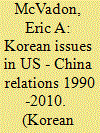

|
|
|
|
|
| Publication |
2010.
|
| Summary/Abstract |
Korean issues in recent history and current affairs have been a remarkable and varied factor with respect to global and regional security and in relations between the United States and China-arguably the most important bilateral relationship in today's world. The extraordinary events and remarkable developments that compose this saga merit review, including many forgotten, unknown, or ignored developments and details. This examination is based on the author's experiences in various capacities, official and independent, over two decades. Much of it derives from his extensive contacts, conversations, and candid exchanges with People's Republic of China (PRC) and the Republic of Korea (ROK) government officials, military officers (active and retired), think-tankers, and other scholars and specialists. It describes the ups and downs of relations between the People's Republic of China (PRC) and the Democratic People's Republic of Korea (DPRK) and encompasses ROK-PRC and ROK-U.S. issues. The article concludes with a comprehensive analysis of the current debate in the United States and China on how to deal with North Korea and how to advise the Obama administration. The author lived the history, researched the intriguing details and startling twists and turns, and is now a constant close observer and sometimes active participant in the ongoing debate about how best to handle North Korea.
|
|
|
|
|
|
|
|
|
|
|
|
|
|
|
|
| 8 |
ID:
099683


|
|
|
|
|
| Publication |
2010.
|
| Summary/Abstract |
Japan and the Republic of Korea are the United States' two most important allies in East Asia. Although U.S. alliances with those countries have succeeded in maintaining peace and stability in Northeast Asia, it is not clear how effective they would prove to be should they be tested by a major incident originating, say, in North Korea, because South Korea-Japan relations are troublesome. The issues that divide these two countries, based on strong and long-standing emotional attitudes that are resistant to change, largely revolve around Korean perceptions that the Japanese have not sufficiently recognized and apologized for past aggression against their neighbors during the first half of the twentieth century. For its part, the United States can improve trilateral relations by avoiding foreign policy decisions that make other countries nervous, such as decisions based on the principle of preemptive attack. A resumption of trilateral security dialogue is also needed. The U.S. alliances with Japan and South Korea must be preserved to keep the peace in Northeast Asia, and it is important that politicians and government officials in Korea and Japan adopt a strategic view and not let emotional issues stand in the way of pursuing the best interests of their respective governments.
|
|
|
|
|
|
|
|
|
|
|
|
|
|
|
|
|
|
|
|
|